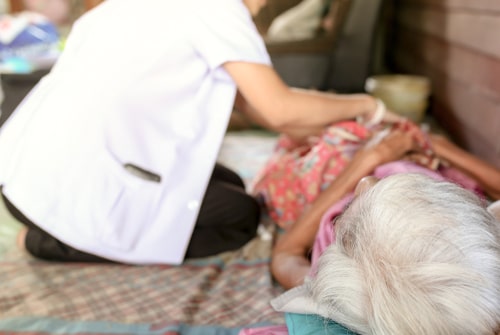If you or a loved one has ever suffered from pressure ulcers—often called bedsores—you know how painful they can be, and how they can interfere with rest and sleep. In a nursing home, these are some of the most preventable yet distressing conditions affecting residents.
Unfortunately, it’s often neglect on the part of the nursing home staff that leads to the development of pressure ulcers. If you noticed this type of neglect and suffered from difficult injuries because of it, contact our Virginia Beach nursing home abuse attorneys. We have the resources necessary to handle complex injury investigations and will do everything we can to help you recover the compensation you need.
What Are Pressure Ulcers?
Pressure ulcers develop when prolonged pressure on the skin restricts blood flow. This damages the underlying tissue. If left untreated, pressure ulcers can lead to severe infections, complications, and in the most severe cases, even death.
These ulcers most commonly show up on bony areas that have less fatty padding under the skin, like the heels, hips, sacrum, and tailbone. They are categorized into four stages based on their severity:
- Stage 1: The sore is red but doesn’t show an open wound.
- Stage 2: The sore is shallow and open, or looks like a blister.
- Stage 3: Deep wounds that have been neglected expose the fatty tissue under the surface of the skin.
- Stage 4: The sores have caused severe damage, exposing muscle, tendons, or bone.
Elderly residents in nursing homes are particularly vulnerable to more severe sores. They are often immobile or struggle with mobility, and they also have fragile skin and may suffer from chronic health conditions. The nursing home staff is responsible for giving these residents diligent care to help prevent painful pressure sores.
Nursing Home Staff Responsibilities: Turning and Repositioning
The key component in pressure sores is that the person remains in the same place too long, putting steady pressure on one area of the skin. To prevent this, nursing home staff should be trained on regularly turning and repositioning immobile residents every two hours. This is standard nursing home practice, known to help maintain blood flow and minimize pressure on sensitive, fragile skin.
Regular turning and repositioning helps:
- Restore circulation: Changing positions helps restore blood flow to any areas under pressure, which reduces the risk of tissue damage.
- Skin integrity: Regular repositioning minimizes friction on fragile skin, preventing tears and open wounds.
- Resident comfort: You know what it’s like to be in one position for a long time. It hurts! Regular repositioning not only helps prevent pressure ulcers but also helps keep residents comfortable.
In addition to these turning and repositioning, nursing homes can implement other interventions to help prevent pressure ulcers.
- Elevating ankles and heels: Placing pillows or cushions under the ankles can reduce pressure on the heels and promote circulation.
- Use specialized mattresses: Some types of mattresses—such as air and foam mattresses—distribute weight more evenly, reducing pressure on bony areas. Pressure-relief pads can also be used to do the same.
- Skin inspections: Regularly checking over a resident’s skin allows medical staff to detect early signs of pressure ulcers and respond accordingly.
- Hydration and nutrition: Proper hydration and a diet rich in proteins, vitamins, and minerals can help support optimal skin health.
- Hygiene: Keeping the skin dry and clean reduces the risk of infection and irritation, which can worsen pressure ulcers.
Laws Governing Nursing Home Care
Federal regulations require nursing homes to a certain level of care to nursing home residents. Under the Nursing Home Reform Act of 1987, facilities that receive Medicare and Medicaid funding have to provide services that help residents maintain their best possible physical and mental well-being—and that includes providing care that helps prevent pressure ulcers.
Virginia state law, as well, emphasizes the importance of proper care of residents in nursing homes. Under Virginia Code 22VAC40-73-470, nursing home facilities must ensure that the health care service needs of the residents are met, and that includes specifically avoiding complications like pressure ulcers.
Under Virginia Code 12VAC5-371-220, as well, the laws states that nursing facilities shall provide services to prevent clinically avoidable complications, including pressure ulcer development.
How Can a Nursing Home Neglect Attorney Help?
If you or a loved one suffered from pressure ulcers because of nursing home neglect, contact our firm today for a free initial consultation. We know how to investigate cases of neglect and hold those facilities that fail to meet appropriate standards of care accountable for their actions. Damages from a nursing home claim can help cover medical costs, future medical expenses, pain and suffering, and past and future impairment.
Find our offices in Virginia Beach, Portsmouth, Hampton, Chesapeake, and Norfolk.
